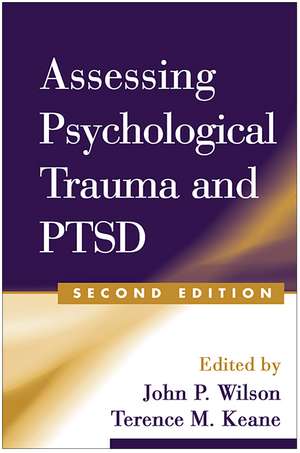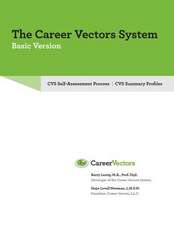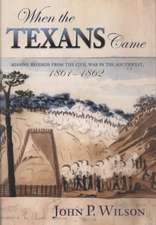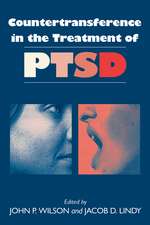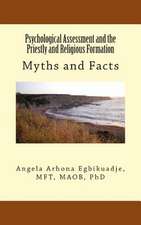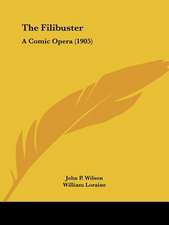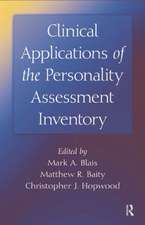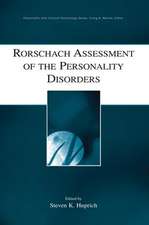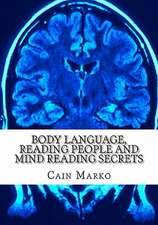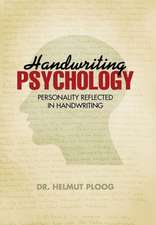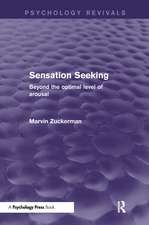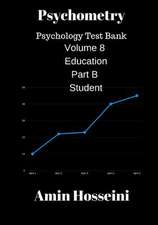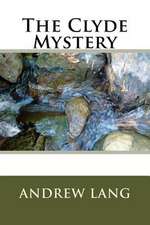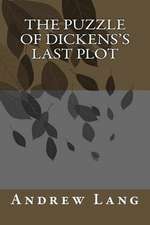Assessing Psychological Trauma and PTSD, Second Edition
Editat de John P. Wilson, Terence M. Keaneen Limba Engleză Hardback – 12 aug 2004
From prominent authorities in the field, the revised and expanded second edition of this acclaimed work is an essential resource for anyone providing treatment services or conducting research in the area of trauma and PTSD. The volume reviews the breadth of current knowledge about trauma assessment and provides clear, up-to-date recommendations for practice. Coverage encompasses the uses of standardized measures, clinical procedures, epidemiological methods, and projective techniques, as well as approaches to evaluating specific survivor populations. Existing chapters have been fully rewritten and seven entirely new chapters added, addressing recent developments in classification; emerging applications of neuroimaging and pharmacological probes; legal and forensic issues in assessment; assessment of comorbid PTSD and substance abuse; and effects of trauma on physical health.
Preț: 607.81 lei
Preț vechi: 639.81 lei
-5% Nou
Puncte Express: 912
Preț estimativ în valută:
116.32€ • 120.99$ • 96.03£
116.32€ • 120.99$ • 96.03£
Carte tipărită la comandă
Livrare economică 14-28 aprilie
Preluare comenzi: 021 569.72.76
Specificații
ISBN-13: 9781593850357
ISBN-10: 1593850352
Pagini: 668
Dimensiuni: 156 x 234 x 43 mm
Greutate: 1.18 kg
Ediția:2
Editura: Guilford Publications
Colecția Guilford Press
ISBN-10: 1593850352
Pagini: 668
Dimensiuni: 156 x 234 x 43 mm
Greutate: 1.18 kg
Ediția:2
Editura: Guilford Publications
Colecția Guilford Press
Public țintă
Professional Practice & DevelopmentCuprins
Introduction, John P. Wilson and Terence M. Keane
I. Understanding and Assessing Trauma and PTSD
1. PTSD and Complex PTSD: Symptoms, Syndromes, and Diagnoses, John P. Wilson
2. Assessing Acute Stress Disorder, Richard A. Bryant
II. Assessment Methods
3. Standardized Self-Report Measures of Civilian Trauma and PTSD, Fran H. Norris and Jessica Hamblen
4. Structured Clinical Interview Techniques for PTSD, Daniel S. Weiss
5. Systematic Assessment of Posttraumatic Dissociation: The Structured Clinical Interview for DSM-IV Dissociative Disorders, Marlene Steinberg
6. The Peritraumatic Dissociative Experiences Questionnaire, Charles R. Marmar, Thomas J. Metzler, and Christian Otte
7. The Impact of Event Scale-Revised, Daniel S. Weiss
8. The Role of the Rorschach in the Assessment and Treatment of Trauma, Toni Luxenberg and Patti Levin
9. Epidemiological Methods for Assessing Trauma and PTSD, William E. Schlenger, B. Kathleen Jordan, Juesta M. Caddell, Lori Ebert, and John A. Fairbank
10. The Assessment of Military-Related PTSD, Terence M. Keane, Amy E. Street, and Jane Stafford
III. Psychobiology
11. Psychophysiological Assessment of PTSD, Scott P. Orr, Linda J. Metzger, Mark W. Miller, and Danny G. Kaloupek
12. Assessing Neuropsychological Concomitants of Trauma and PTSD, Jeffrey A. Knight and Casey T. Taft
13. Neuroimaging Studies in PTSD, Joan Kaufman, Deane Aikins, and John Krystal
14. Psychobiological Laboratory Assessment of PTSD, Matthew J. Friedman
IV. Physical Health, Substance Use Disorder, and Bereavement
15. Trauma, PTSD, and Physical Health: Clinical Issues, Todd C. Buckley, Bonnie L. Green, and Paula P. Schnurr
16. Assessment of Trauma, PTSD, and Substance Use Disorder: A Practical Guide, Lisa M. Najavits
17. Assessing Traumatic Bereavement, Beverley Raphael, Nada Martinek, and Sally Wooding
V. Psychosocial Development and Gender Issues
18. Assessing Traumatic Experiences in Children, Kathleen O. Nader
19. Psychological Assessment of Child Abuse Effects in Adults, John Briere
20. Gender Issues in the Assessment of PTSD, Rachel Kimerling, Annabel Prins, Darrah Westrup, and Tina Lee
VI. Assessing Traumatic Injury in Litigation
21. Forensic/Clinical Assessment of Psychological Trauma and PTSD in Legal Settings, John P. Wilson and Thomas A. Moran
I. Understanding and Assessing Trauma and PTSD
1. PTSD and Complex PTSD: Symptoms, Syndromes, and Diagnoses, John P. Wilson
2. Assessing Acute Stress Disorder, Richard A. Bryant
II. Assessment Methods
3. Standardized Self-Report Measures of Civilian Trauma and PTSD, Fran H. Norris and Jessica Hamblen
4. Structured Clinical Interview Techniques for PTSD, Daniel S. Weiss
5. Systematic Assessment of Posttraumatic Dissociation: The Structured Clinical Interview for DSM-IV Dissociative Disorders, Marlene Steinberg
6. The Peritraumatic Dissociative Experiences Questionnaire, Charles R. Marmar, Thomas J. Metzler, and Christian Otte
7. The Impact of Event Scale-Revised, Daniel S. Weiss
8. The Role of the Rorschach in the Assessment and Treatment of Trauma, Toni Luxenberg and Patti Levin
9. Epidemiological Methods for Assessing Trauma and PTSD, William E. Schlenger, B. Kathleen Jordan, Juesta M. Caddell, Lori Ebert, and John A. Fairbank
10. The Assessment of Military-Related PTSD, Terence M. Keane, Amy E. Street, and Jane Stafford
III. Psychobiology
11. Psychophysiological Assessment of PTSD, Scott P. Orr, Linda J. Metzger, Mark W. Miller, and Danny G. Kaloupek
12. Assessing Neuropsychological Concomitants of Trauma and PTSD, Jeffrey A. Knight and Casey T. Taft
13. Neuroimaging Studies in PTSD, Joan Kaufman, Deane Aikins, and John Krystal
14. Psychobiological Laboratory Assessment of PTSD, Matthew J. Friedman
IV. Physical Health, Substance Use Disorder, and Bereavement
15. Trauma, PTSD, and Physical Health: Clinical Issues, Todd C. Buckley, Bonnie L. Green, and Paula P. Schnurr
16. Assessment of Trauma, PTSD, and Substance Use Disorder: A Practical Guide, Lisa M. Najavits
17. Assessing Traumatic Bereavement, Beverley Raphael, Nada Martinek, and Sally Wooding
V. Psychosocial Development and Gender Issues
18. Assessing Traumatic Experiences in Children, Kathleen O. Nader
19. Psychological Assessment of Child Abuse Effects in Adults, John Briere
20. Gender Issues in the Assessment of PTSD, Rachel Kimerling, Annabel Prins, Darrah Westrup, and Tina Lee
VI. Assessing Traumatic Injury in Litigation
21. Forensic/Clinical Assessment of Psychological Trauma and PTSD in Legal Settings, John P. Wilson and Thomas A. Moran
Notă biografică
John P. Wilson, PhD, is Professor of Psychology at Cleveland State University, a Fulbright Scholar, and a widely recognized international expert on PTSD. He is cofounder and past president of the International Society for Traumatic Stress Studies (ISTSS), a Diplomate and Fellow of the American Academy of Experts in Traumatic Stress, and a Fellow of the American Institute of Stress. Dr. Wilson is the coeditor of Countertransference in the Treatment of PTSD and Treating Psychological Trauma and PTSD.
Terence M. Keane, PhD, is Professor and Vice Chairman of Research in Psychiatry at the Boston University School of Medicine. He is also Chief of Psychology and Director of the National Center for PTSD at the VA Boston Healthcare System. Past president of the ISTSS, he has published six books and over 160 articles on the assessment and treatment of PTSD. His contributions to the field have been recognized by many honors, including the Robert Laufer Award for Outstanding Scientific Achievement from ISTSS, a Fulbright Scholarship, and an Outstanding Research Contribution Award and the Distinguished Service Award from the Division of Public Service Psychologists of the American Psychological Association. Dr. Keane is a Fellow of the American Psychological Association and the American Psychological Society and has lectured and conducted workshops internationally.
Terence M. Keane, PhD, is Professor and Vice Chairman of Research in Psychiatry at the Boston University School of Medicine. He is also Chief of Psychology and Director of the National Center for PTSD at the VA Boston Healthcare System. Past president of the ISTSS, he has published six books and over 160 articles on the assessment and treatment of PTSD. His contributions to the field have been recognized by many honors, including the Robert Laufer Award for Outstanding Scientific Achievement from ISTSS, a Fulbright Scholarship, and an Outstanding Research Contribution Award and the Distinguished Service Award from the Division of Public Service Psychologists of the American Psychological Association. Dr. Keane is a Fellow of the American Psychological Association and the American Psychological Society and has lectured and conducted workshops internationally.
Recenzii
The essence of knowledge comes from accurate description and measurement, and there is no field whose current acceptance is more indebted to systematic, reliable research than the study of traumatic events. This second edition is an invaluable handbook and guide for anyone planning to investigate this domain. The breadth of topics covered also makes it a useful resource for students seeking to deepen their knowledge of trauma assessment. The addition of chapters about neuroimaging and psychobiology, and about the assessment of PTSD in legal settings, enhances the breadth and utility of this essential text.--Alexander C. McFarlane, MD, Department of Psychiatry, University of Adelaide, Australia
In the rapidly developing field of psychological trauma and PTSD, the second edition of this authoritative book is a most important contribution. Thoroughly revised, updated, and expanded, the book is an invaluable resource for seasoned and novice researchers, clinicians, and graduate students. Authors clearly operationalize relevant constructs related to traumatization and PTSD, and detail the psychometrics and appropriate uses of major measurement instruments. Among the many features of the second edition, the new section on psychobiological assessment is particularly noteworthy.--Onno van der Hart, PhD, Department of Clinical Psychology, Utrecht University, The Netherlands; past president, International Society for Traumatic Stress Studies
In this second edition of this classic work, the editors have assembled expert and comprehensive coverage of most of the issues inherent in assessing the wide-ranging effects of traumatic events. Relevant methodological issues are treated in a sophisticated yet clear and accessible manner. A research-based clinical approach to the assessment of traumatic stress reactions is complemented with critical surveys of useful assessment tools and experimental measures. Careful application of the wisdom contained in this text will ensure that research and clinical practice relating to PTSD remains evidence-based and continues to bring benefit to patients.--William Yule, PhD, Department of Psychology, Institute of Psychiatry, King's College London, UK
Because trauma affects people in highly variable but pervasive ways, thorough and reliable assessment across multiple domains of functioning is indispensable to clinical decision making, treatment planning, and therapeutic progress monitoring. In this excellent second edition, Wilson and Keane have once again assembled a 'who's who' of leading researchers in assessment to cover the latest evidence-based assessment tools and strategies designed to evaluate trauma survivors across the lifespan and across all domains of functioning. The result is a cutting-edge, scholarly, and useful volume. It is a 'must read' for trauma professionals across the spectrum of subspecialties, as well as clinical trainees and graduate students.--Brett Litz, PhD, Department of Psychiatry, Boston University School of Medicine; National Center for PTSD, VA Boston Healthcare System
-In the rapidly developing field of psychological trauma and PTSD, the second edition of this authoritative book is a most important contribution. Thoroughly revised, updated, and expanded, the book is an invaluable resource for seasoned and novice researchers, clinicians, and graduate students. Authors clearly operationalize relevant constructs related to traumatization and PTSD, and detail the psychometrics and appropriate uses of major measurement instruments. Among the many features of the second edition, the new section on psychobiological assessment is particularly noteworthy.--Onno van der Hart, PhD, Department of Clinical Psychology, Utrecht University, The Netherlands; past president, International Society for Traumatic Stress Studies
In this second edition of this classic work, the editors have assembled expert and comprehensive coverage of most of the issues inherent in assessing the wide-ranging effects of traumatic events. Relevant methodological issues are treated in a sophisticated yet clear and accessible manner. A research-based clinical approach to the assessment of traumatic stress reactions is complemented with critical surveys of useful assessment tools and experimental measures. Careful application of the wisdom contained in this text will ensure that research and clinical practice relating to PTSD remains evidence-based and continues to bring benefit to patients.--William Yule, PhD, Department of Psychology, Institute of Psychiatry, King's College London, UK
Because trauma affects people in highly variable but pervasive ways, thorough and reliable assessment across multiple domains of functioning is indispensable to clinical decision making, treatment planning, and therapeutic progress monitoring. In this excellent second edition, Wilson and Keane have once again assembled a 'who's who' of leading researchers in assessment to cover the latest evidence-based assessment tools and strategies designed to evaluate trauma survivors across the lifespan and across all domains of functioning. The result is a cutting-edge, scholarly, and useful volume. It is a 'must read' for trauma professionals across the spectrum of subspecialties, as well as clinical trainees and graduate students.--Brett Litz, PhD, Department of Psychiatry, Boston University School of Medicine; National Center for PTSD, VA Boston Healthcare System
Descriere
From prominent authorities in the field, the revised and expanded second edition of this acclaimed work is an essential resource for anyone providing treatment services or conducting research in the area of trauma and PTSD. The volume reviews the breadth of current knowledge about trauma assessment and provides clear, up-to-date recommendations for practice. Coverage encompasses the uses of standardized measures, clinical procedures, epidemiological methods, and projective techniques, as well as approaches to evaluating specific survivor populations. Existing chapters have been fully rewritten and seven entirely new chapters added, addressing recent developments in classification; emerging applications of neuroimaging and pharmacological probes; legal and forensic issues in assessment; assessment of comorbid PTSD and substance abuse; and effects of trauma on physical health.
